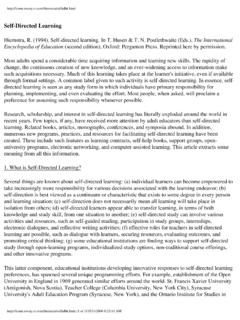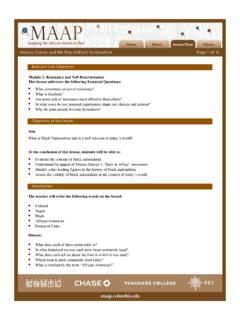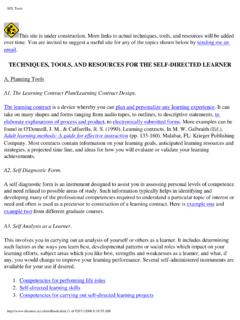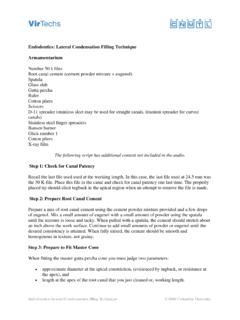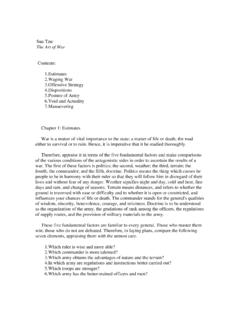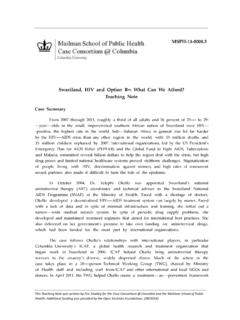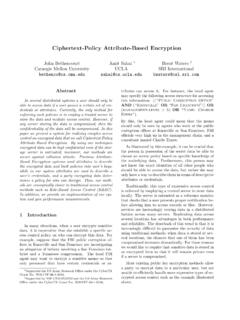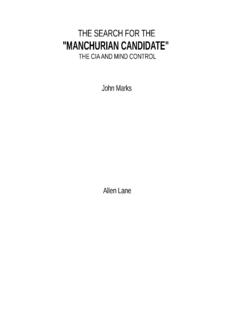Transcription of CHAPTER 1 DEFINING INVESTIGATIVE REPORTING What …
1 CHAPTER 1 DEFINING INVESTIGATIVE REPORTING What makes it different from other types of journalism? INVESTIGATIVE REPORTING has many, sometimes widely divergent, meanings. To understand what INVESTIGATIVE REPORTING is, it may be best to start by explaining what it is not. It is said that all REPORTING is INVESTIGATIVE . After all, journalists routinely dig for facts. They ask questions. They get information. They investigate. But is this really the case? In the day-to-day practice of journalism, how deep do reporters really dig? How probing are their questions? And how complete or original is the information that they present? If reporters attend a press conference and then write about it, they cannot be said to be doing INVESTIGATIVE REPORTING .
2 If they interview those wounded in a police operation and then report what they have been told, that is not INVESTIGATIVE journalism either. The reality is that daily news coverage is usually not probing or INVESTIGATIVE . It reports mainly what officials or institutions say as well as other people s responses to what has been previously said. Much of what we consider news are reports on official statements or reactions to official statements. Daily journalism is also mainly about events that reporters have witnessed or interviewed witnesses about such as a train collision, a demonstration, a criminal being arrested. There is no digging beyond what has been said or what has been seen.
3 Daily news REPORTING is seldom INVESTIGATIVE , it is mostly reactive. Most of the time, journalists react to what is happening or what has been publicly announced. Reporters seldom decide on their own what or who they cover. They often do not initiate story ideas. Unfolding events and the daily schedule of news briefings and press conferences determine what the makes it to the newspaper, the newscast or the Web. For the most part, journalists do not set the news agenda. Instead, they take the information they have been given by weighing its significance (does the president s statement, for example, deserve to be on the front page of a newspaper or the first five minutes of a newscast?)
4 , checking its accuracy, and putting it in context. The news reporter s job is to confirm the facts of the story, make sense of them and to put them together in a coherent report. INVESTIGATIVE REPORTING , however, does not just report the information that has been given out by others whether it is government, political parties, companies or advocacy groups. It is REPORTING that relies on the journalist s own enterprise and initiative. INVESTIGATIVE REPORTING means journalists go beyond what they have seen and what has been said to unearth more facts and to provide something new and previously unknown. Most of the time, INVESTIGATIVE reporters uncover wrongdoing by individuals and institutions.
5 The good that public officials or private companies do is often publicized; a whole army of public relations people makes sure this is so. It s the wrong that powerful groups and individuals do that is kept away from the public. This is why INVESTIGATIVE REPORTING often involves digging up what is secret or hidden. In some parts of the world, the term INVESTIGATIVE REPORTING is sometimes associated with leaks. Public officials, police and intelligence agents or politicians selectively leak or release secret information or INVESTIGATIVE files in order to promote their own interests. Journalists report on the leaked information, often without checking or looking for additional facts on their own.
6 Leak journalism is not INVESTIGATIVE REPORTING . An investigation can begin from a leak, but journalists must do their own digging, verify information and provide context. Unless they do so, their reports will be distorted and incomplete. They will also be allowing themselves to be used to manipulate public opinion and to advance the agenda of individuals, rather than the public interest. INVESTIGATIVE REPORTING entails the use of multiple sources both human and documentary that together paint a picture of wrongdoing or abuse. It requires the verification and corroboration of every piece of information, even if these come from sources that are considered reliable or authoritative.
7 REPORTING based on a single source cannot be considered INVESTIGATIVE . Paul Radu, founder of the Romanian Centre for INVESTIGATIVE Journalism (or CRJI, its Romanian initials), says that some reporters have used the information they have uncovered in their investigations to extort money from individuals or companies. That is true not just in Romania but elsewhere in the world as well. These reporters taint the name of INVESTIGATIVE journalism and do damage to its tradition and reputation. Using information for extortion is not INVESTIGATIVE journalism. INVESTIGATIVE journalism is also sometimes confused with stalking powerful or well-known people and writing intimate details about their private lives, uncovering such things as love affairs or other dark secrets .
8 It is true that INVESTIGATIVE reporters sometimes uncover details on the private lives of individuals for example, the investigation by a newspaper of Catholic priests accused of abusing boys. But such investigations are done only when there is a clear public interest in exposure in this case, the priests conducted the abuse over many years and the Catholic Church hierarchy knew the abuses were taking place but did not take action. In corruption investigations in the Philippines and China, journalists have reported on the mistresses of high public officials who were accused of bribery. The mistresses were either conduits for the bribes or beneficiaries.
9 A Philippine president, for example, was found guilty of building fabulous mansions for four mistresses. In China, an INVESTIGATIVE journalist exposed a mayor who used public funds to buy apartments for 29 mistresses. In both these cases, there was a clear public interest in REPORTING on the private lives of officials: either public funds were involved or bribery a crime and betrayal of the public trust was being committed. INVESTIGATIVE REPORTING is not paparazzi journalism. Its focus is not private lives; it is the public good. Watchdog journalism INVESTIGATIVE REPORTING is watchdog journalism: it aims to check the abuses of those who have wealth and power.
10 It exposes wrongdoing so it can be corrected, not because journalists and their patrons benefit from exposure. Various metaphors have been used to describe the work that INVESTIGATIVE journalists do. They lift the veil of secrecy by uncovering previously unknown facts, such as the surveillance and wiretapping of citizens by government security forces, which journalists reported in 2005. Another example is the REPORTING by journalists in North America, Europe, South Asia and the Middle East on secret renditions the abduction and detention in secret prisons of suspected terrorists after the 9/11 attacks in the United States. INVESTIGATIVE journalists strike through the mask they go beyond what is publicly proclaimed and expose the lies and hypocrisy of those who wield power.
